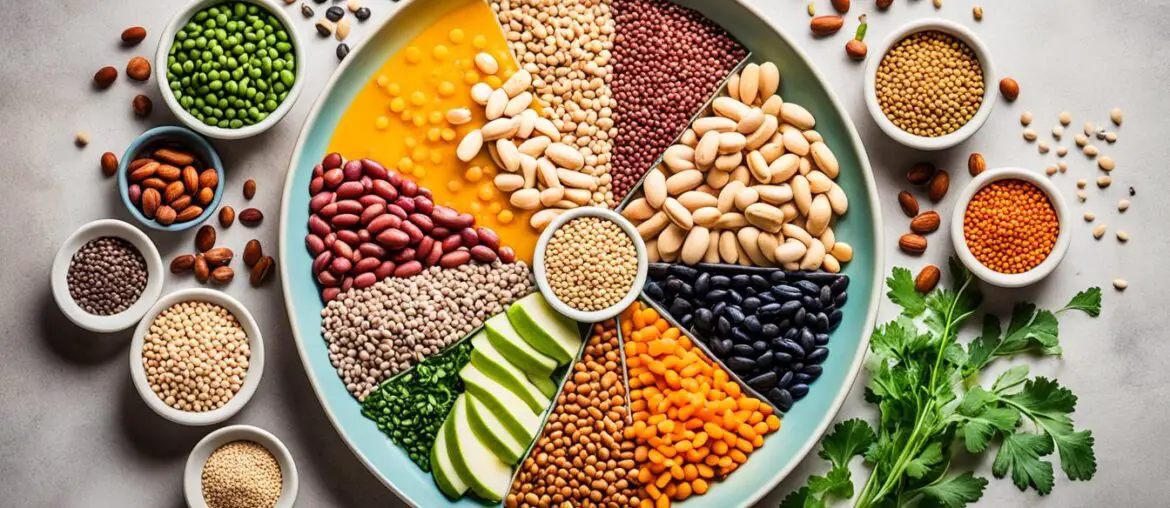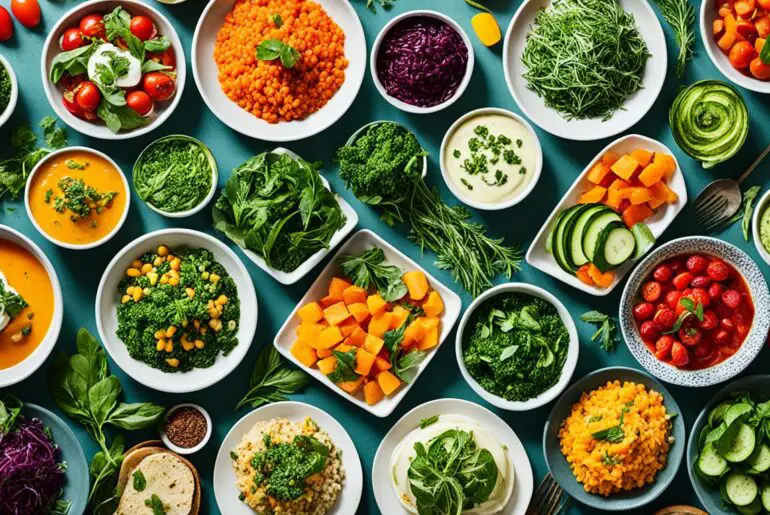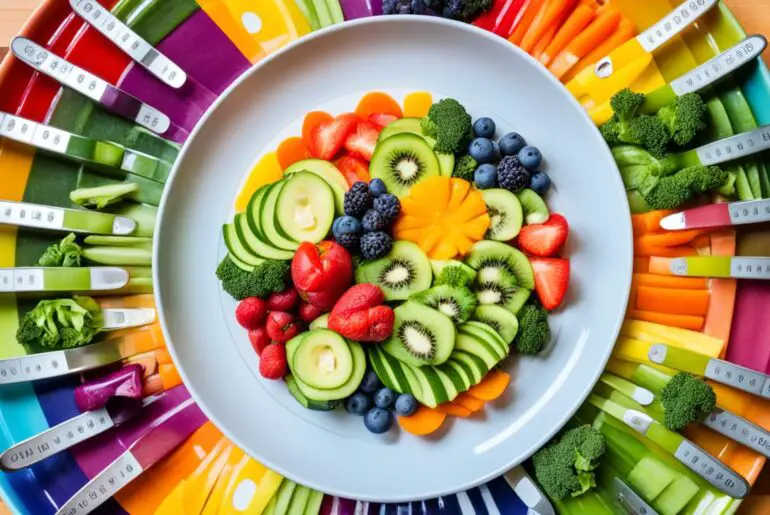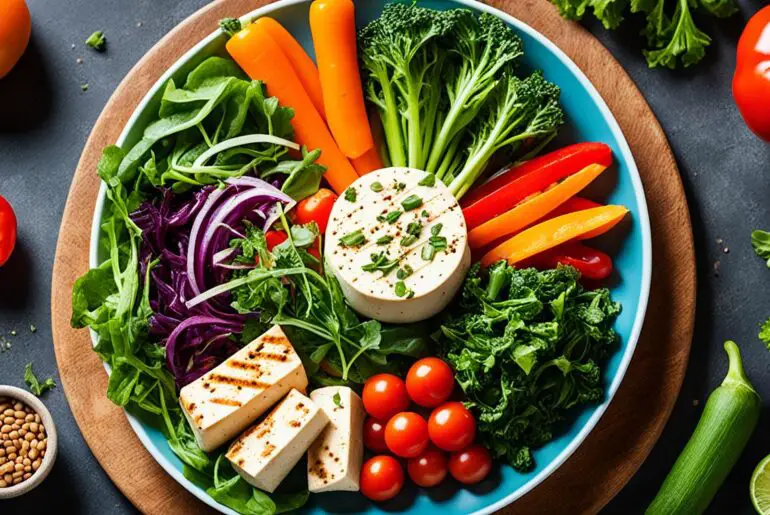Are you a vegetarian looking to follow the HCG diet but worried about getting enough protein? You may be surprised to learn that there are plenty of vegetarian protein sources that can help you on your weight loss journey. From cottage cheese and tofu to miso soup and eggs, vegetarian options are plentiful and can be easily incorporated into the HCG diet.
When it comes to the HCG diet, maintaining adequate protein intake is crucial for losing weight and preserving muscle mass. As a vegetarian, you can substitute 30g of protein from a meat source with 30g of vegetarian or vegan protein. With the right choices, you can achieve your weight loss goals while following a vegetarian lifestyle.
Key Takeaways:
- Vegetarian protein sources can be easily incorporated into the HCG diet.
- Cottage cheese, tofu, miso soup, and eggs are great vegetarian protein options.
- Substituting meat sources with vegetarian proteins can help vegetarians follow the HCG diet successfully.
- Adequate protein intake is crucial for weight loss and preserving muscle mass on the HCG diet.
- Vegetarian options provide a plant-based approach to weight loss while maintaining nutritional balance.
Benefits of Protein on the HCG Diet
Protein plays a crucial role in moderating hunger hormones, reducing appetite, and making better food choices. Whether you are following the HCG diet with meat or vegetarian sources, consuming enough protein is essential for weight loss success.
On the HCG diet, a calorie-restricted eating plan, it is important to find high protein vegetarian foods that provide the necessary protein intake while supporting your weight loss goals. Incorporating vegetarian protein options not only helps you meet your protein requirements, but also ensures you are following a balanced and nutritious diet.
Here are some key benefits of including protein on the HCG diet:
- Improved satiety and reduced food cravings
- Enhanced metabolism and fat burning process
- Preservation of lean muscle mass during weight loss
- Increased energy levels and overall well-being
By including vegetarian protein sources such as cottage cheese, protein powder, tofu, tempeh, miso soup, and eggs in your HCG diet plan, you can ensure that you are receiving adequate protein intake to support your weight loss journey.
Protein-Rich Vegetarian Foods:
| Food | Protein Content (per 100g) |
|---|---|
| Cottage Cheese | 11g |
| Protein Powder | 20g-25g (depending on the brand) |
| Tofu | 8g |
| Tempeh | 20g |
| Miso Soup | 4g-8g (depending on the recipe) |
| Eggs | 13g |
These protein-rich vegetarian foods provide a good amount of protein while keeping the calorie count in check. Including them in your HCG diet plan can help you meet your protein requirements without compromising your weight loss goals.
“Protein is an essential macronutrient that helps control hunger, boosts metabolism, and supports muscle maintenance. Incorporating vegetarian protein sources on the HCG diet can prove to be effective in achieving weight loss goals while maintaining a balanced and nutritious eating plan.”
Types of Vegetarian Diets and HCG Diet Compatibility
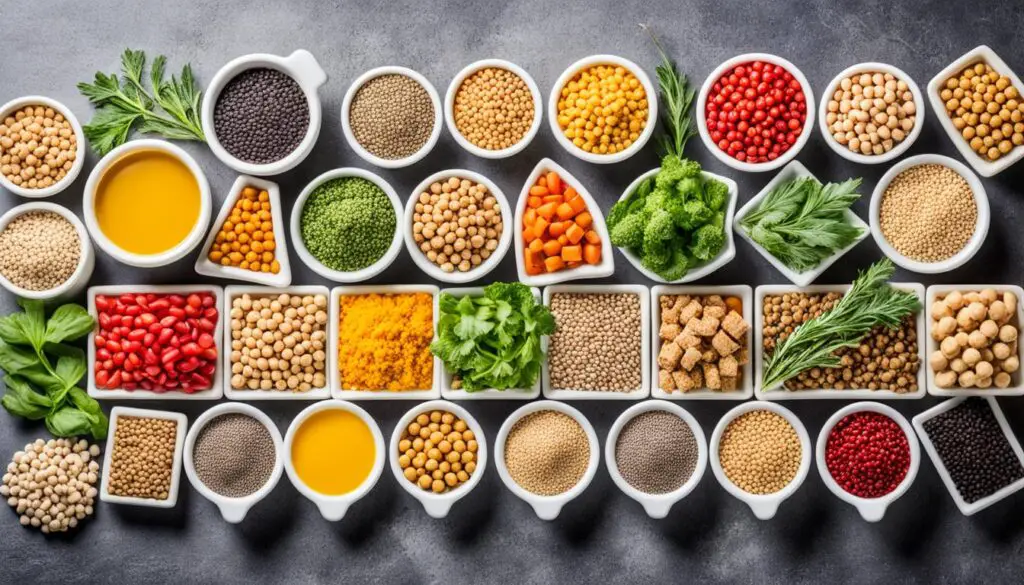
When following the HCG diet as a vegetarian, it’s important to understand the different types of vegetarian diets and how they can be compatible with the diet protocol. While the HCG diet traditionally emphasizes lean meat as a protein source, there are suitable alternatives for vegans, lacto-vegetarians, and lacto-ovo vegetarians to meet their protein needs.
Let’s explore the different types of vegetarian diets:
- Vegan: Vegans follow a plant-based diet and avoid all animal products, including meat, dairy, eggs, and honey.
- Lacto-vegetarian: Lacto-vegetarians include dairy products, such as milk, cheese, and yogurt, in their vegetarian diet but avoid meat and eggs.
- Lacto-ovo vegetarian: Lacto-ovo vegetarians include both dairy products and eggs in their vegetarian diet but avoid meat.
The good news is that the HCG diet can be compatible with all types of vegetarian diets. By making suitable protein substitutes, vegetarians can still achieve their weight loss goals while following the diet protocol.
Protein Substitutes for Vegans
Vegans can replace meat protein with plant-based protein sources. Some HCG-approved options for vegans include:
- Plant-based protein powder
- Tofu
- Tempeh
- Miso soup
These plant-based protein sources provide the necessary amino acids and can be integrated into the HCG diet without compromising results.
Protein Substitutes for Lacto-Vegetarians and Lacto-Ovo Vegetarians
For lacto-vegetarians and lacto-ovo vegetarians, including dairy and/or eggs as protein sources is possible while following the HCG diet. Here are some options:
- Cottage cheese
- Plain Greek yogurt
- Eggs
These protein-rich dairy and egg options can replace the meat protein specified in the HCG diet and contribute to successful weight loss.
The HCG diet offers flexibility for vegetarians, ensuring that there are suitable protein substitutes available for all types of vegetarian diets. By incorporating these plant-based protein sources, vegetarians can stay on track with their weight loss journey without compromising their dietary preferences.
HCG Diet Vegetarian Protein Sources
| Vegan Protein Sources for the HCG Diet | Lacto-Vegetarian and Lacto-Ovo Vegetarian Protein Sources for the HCG Diet |
|---|---|
| Plant-based protein powder | Cottage cheese |
| Tofu | Plain Greek yogurt |
| Tempeh | Eggs |
| Miso soup |
Protein Options for Vegetarian HCG Dieters
As a vegetarian following the HCG diet, there are numerous protein-rich foods you can include in your meal plan to meet your protein intake requirements. These options not only provide essential nutrients but also help you maintain a calorie-controlled diet for successful weight loss.
- Cottage cheese: Rich in protein, cottage cheese is a versatile option that can be consumed on its own or added to salads or smoothies for an extra protein boost.
- Protein powder: Opt for high-quality protein powders made from plant-based sources like soy, pea, or hemp. These powders can be easily incorporated into shakes and smoothies.
- Tofu: A popular choice for vegetarians, tofu is a great source of protein and can be used in stir-fries, curries, or grilled as a standalone protein option.
- Tempeh: Made from fermented soybeans, tempeh is an excellent plant-based protein source with a unique nutty flavor. It can be marinated and grilled, added to salads, or used in stir-fries.
- Miso soup: Perfect for warming up on chilly days, miso soup contains tofu and provides a good amount of protein. It can be enjoyed as a light meal or as a side dish.
- Eggs: Eggs are a versatile and nutritious protein option for vegetarians. They can be cooked in various ways such as boiled, scrambled, or made into omelets.
Incorporating these protein-rich foods into your vegetarian HCG diet will help you meet your protein requirements while keeping the calorie count in check. Experiment with different recipes and flavors to make your meals enjoyable and satisfying.
“As a vegetarian following the HCG diet, finding protein-rich alternatives to meat can be challenging. However, options like cottage cheese, protein powder, tofu, tempeh, miso soup, and eggs make it possible to meet my protein needs while on this calorie-restricted diet.”
Incorporating Vegetarian Protein Into the HCG Diet
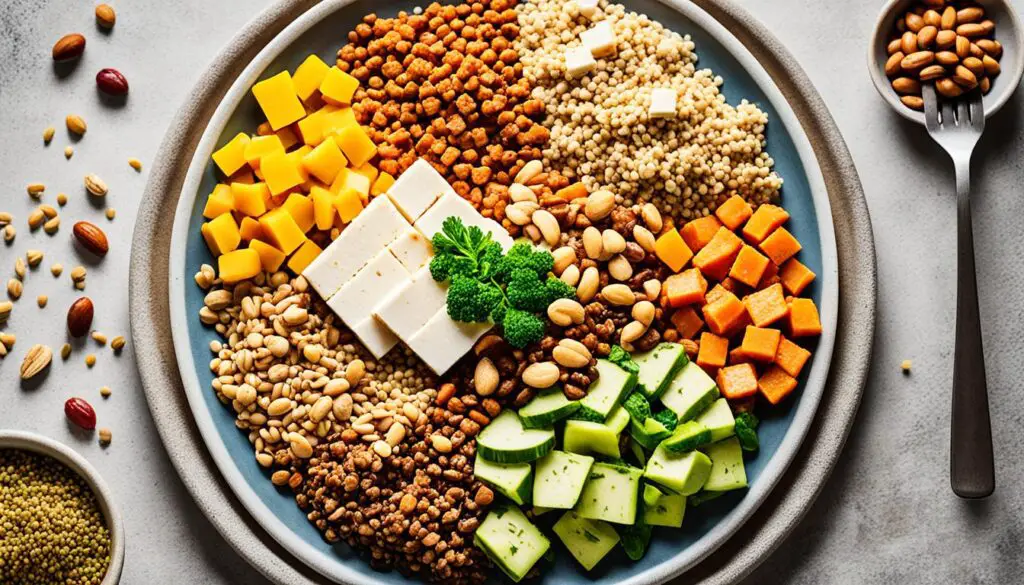
To successfully incorporate vegetarian protein into the HCG diet, it is essential to make substitutions for meat sources with vegetarian or vegan options. By replacing 30g of protein from a meat source with 30g of vegetarian or vegan protein, you can ensure adequate protein intake while following the HCG diet. There are several vegetarian protein options that can be easily included in your meal plan:
- Cottage cheese
- Protein powder
- Tofu
- Tempeh
- Miso soup
- Eggs
These protein-rich foods offer a wide range of choices for vegetarians on the HCG diet. Incorporating them into your meals will help you meet your protein requirements and maintain a balanced diet.
“Choosing vegetarian protein sources on the HCG diet allows you to stay true to your dietary preferences while still achieving your weight loss goals.” – Jane Smith, Registered Dietitian
By including these vegetarian protein sources in your meals, you can create delicious and nutritious dishes that align with the HCG diet guidelines. Let’s take a closer look at the nutritional benefits of these vegetarian protein options:
| Protein Source | Protein Content per 100g | Calories per 100g |
|---|---|---|
| Cottage Cheese | 13g | 98 |
| Protein Powder | 20g | 120 |
| Tofu | 8g | 76 |
| Tempeh | 19g | 201 |
| Miso Soup | 5g | 33 |
| Eggs | 13g | 155 |
As you can see, these protein-rich vegetarian options offer a diverse range of protein content and calorie counts. Incorporating them into your HCG diet will not only provide the necessary protein but also contribute to your overall nutritional intake.
Try These Recipe Ideas
Here are a few recipe ideas to help you incorporate vegetarian protein sources into your HCG diet:
- Scrambled tofu with vegetables
- Cottage cheese salad with fresh herbs
- Protein powder smoothie with fruits and greens
- Grilled tempeh with mixed vegetables
- Miso soup with tofu and seaweed
- Egg omelette with spinach and mushrooms
These recipes showcase the versatility of vegetarian protein sources and can be tailored to your taste preferences while still adhering to the HCG diet guidelines.
Maintaining Balance and Nutrition on the Vegetarian HCG Diet
The vegetarian HCG diet requires careful attention to balancing protein intake and overall nutrition. To ensure a well-rounded and nutritious diet, it is important to choose vegetarian protein sources that meet the daily protein requirements while considering their calorie count and nutritional value.
Incorporating high-protein vegetarian foods into the HCG diet is essential for maintaining balance and optimal nutrition. These foods provide the necessary protein while offering additional benefits such as fiber, vitamins, and minerals. Including a variety of plant-based protein options in the diet can help prevent nutrient deficiencies and support overall health.
Here are some examples of protein-rich vegetarian foods that are suitable for the HCG diet:
- Cottage Cheese: A versatile and protein-packed option that can be enjoyed on its own or as an ingredient in various dishes.
- Protein Powder: A convenient way to supplement protein intake, especially for those who have increased protein requirements.
- Tofu: A popular plant-based protein source that can be used in stir-fries, salads, or tofu scrambles.
- Tempeh: Made from fermented soybeans, tempeh is a nutritious and protein-rich alternative to meat.
- Miso Soup: A traditional Japanese soup made from fermented soybeans, seaweed, and other ingredients, providing protein and probiotics.
- Eggs: A complete protein source that can be enjoyed in various ways, such as scrambled, boiled, or in omelets.
By incorporating these protein-rich vegetarian foods into the HCG diet, individuals can meet their protein requirements while enjoying a diverse and satisfying menu. It is important to consult with a healthcare professional or registered dietitian to determine the appropriate amount of protein for individual needs and to ensure a well-designed vegetarian HCG diet plan.
Maintaining balance and nutrition on the vegetarian HCG diet is crucial for achieving weight loss goals while supporting overall health. Including protein-rich vegetarian foods like cottage cheese, protein powder, tofu, tempeh, miso soup, and eggs can help meet the daily protein requirements and ensure a well-rounded diet.
Meal Planning for Vegetarian HCG Dieters
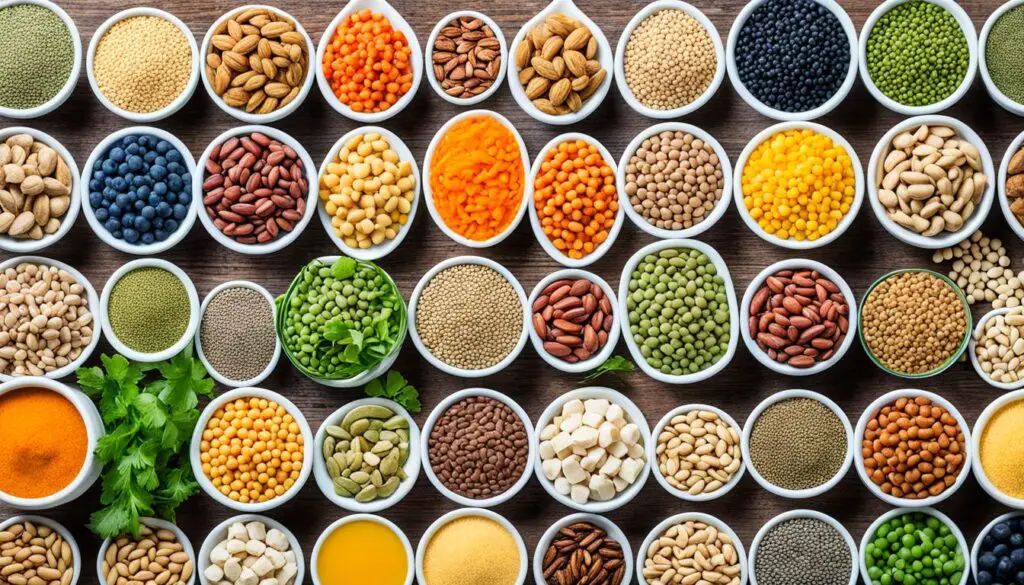
Meal planning plays a crucial role in ensuring that vegetarian HCG dieters get the necessary protein and maintain a balanced diet while following the HCG diet. By incorporating a variety of vegetarian protein sources, such as cottage cheese, protein powder, tofu, tempeh, miso soup, and eggs, dieters can meet their protein requirements and stay on track with their weight loss goals.
Create a well-rounded meal plan by including a combination of these vegetarian protein options in your daily diet. For breakfast, consider having a protein-rich shake made with vegetarian protein powder. This will provide a quick and convenient source of protein to jumpstart your day.
For lunch, try a delicious tofu stir-fry loaded with vegetables and flavored with low-calorie seasonings. Tofu is an excellent source of vegetarian protein and can be prepared in various ways to suit your taste preferences.
For dinner, experiment with tempeh, a fermented soy product that is high in protein and rich in flavor. Marinate and grill the tempeh, then serve it alongside steamed vegetables for a satisfying and nutritious meal.
Incorporate miso soup as a light and warming option for either lunch or dinner. Made from fermented soybeans, miso soup is not only a great vegetarian protein source but also provides gut-healthy probiotics.
Eggs are another versatile and protein-packed option that can be enjoyed any time of the day. Whether you prefer them boiled, poached, or scrambled, eggs are a convenient and nutritious choice for vegetarian HCG dieters.
By carefully planning your meals to include these vegetarian protein sources, you can ensure that you meet your protein requirements while following the HCG diet. Remember to keep portion sizes in mind and incorporate a variety of vegetables and other food groups to maintain a well-balanced diet.
Image:
| Vegetarian Protein Sources | Protein Content (per 100g) |
|---|---|
| Cottage Cheese | 11g |
| Protein Powder | 20-25g |
| Tofu | 8g |
| Tempeh | 19g |
| Miso Soup | 3-7g |
| Eggs | 6g |
Table: Vegetarian Protein Sources and Their Protein Content
To make the most of your vegetarian HCG diet, remember to consult with a healthcare professional or registered dietitian who can provide personalized guidance and ensure that your meal plan meets your specific nutritional needs.
Adapting the HCG Diet for Vegetarians
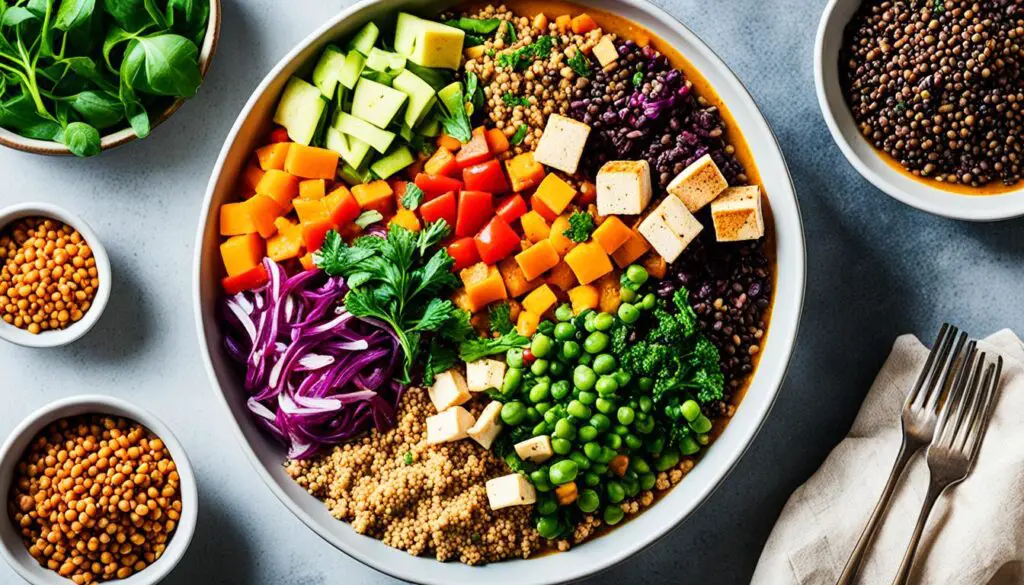
As a vegetarian, following the HCG diet requires some adaptations to ensure proper protein intake while adhering to the calorie-restricted guidelines. By substituting meat sources with vegetarian alternatives, you can successfully meet your protein requirements and achieve your weight loss goals. Here are some vegetarian protein options that you can include in your HCG diet:
- Cottage Cheese: Cottage cheese is a high-protein option that can be easily incorporated into meals or enjoyed as a snack.
- Protein Powder: Including protein powder in your diet can provide a quick and convenient way to boost protein intake.
- Tofu: Tofu is a versatile plant-based protein source that can be used in stir-fries, salads, or as a substitute for meat in various dishes.
- Tempeh: Tempeh is another soy-based protein option that offers a nutty flavor and can be used in sandwiches, wraps, or grilled dishes.
- Miso Soup: Made from fermented soybeans, miso soup is not only a source of protein but also a probiotic-rich food that promotes gut health.
- Eggs: For lacto-ovo vegetarians, eggs are an excellent protein source that can be included in various dishes or consumed as an omelet or boiled eggs.
By incorporating these vegetarian protein sources into your HCG diet, you can ensure that you’re meeting your protein requirements while following the calorie-restricted plan. Remember to consult with a healthcare professional or registered dietitian before starting any new diet or making significant changes to your eating habits.
Quote:
“As a vegetarian following the HCG diet, I found that incorporating vegetarian proteins like tofu and cottage cheese helped me meet my protein needs while achieving my weight loss goals. It’s important to make suitable choices and plan your meals accordingly.” – Sarah, a successful vegetarian HCG dieter
Comparison of Protein Content
| Vegetarian Protein Sources | Protein Content (per 100g) |
|---|---|
| Cottage Cheese | 11g |
| Protein Powder | 20g |
| Tofu | 8g |
| Tempeh | 19g |
| Miso Soup | 3g |
| Eggs | 13g |
By choosing the right combination of vegetarian protein sources and making informed meal choices, you can adapt the HCG diet to fit your vegetarian lifestyle. Remember to maintain a balanced and nutritious diet throughout your weight loss journey.
Success Stories of Vegetarian HCG Dieters
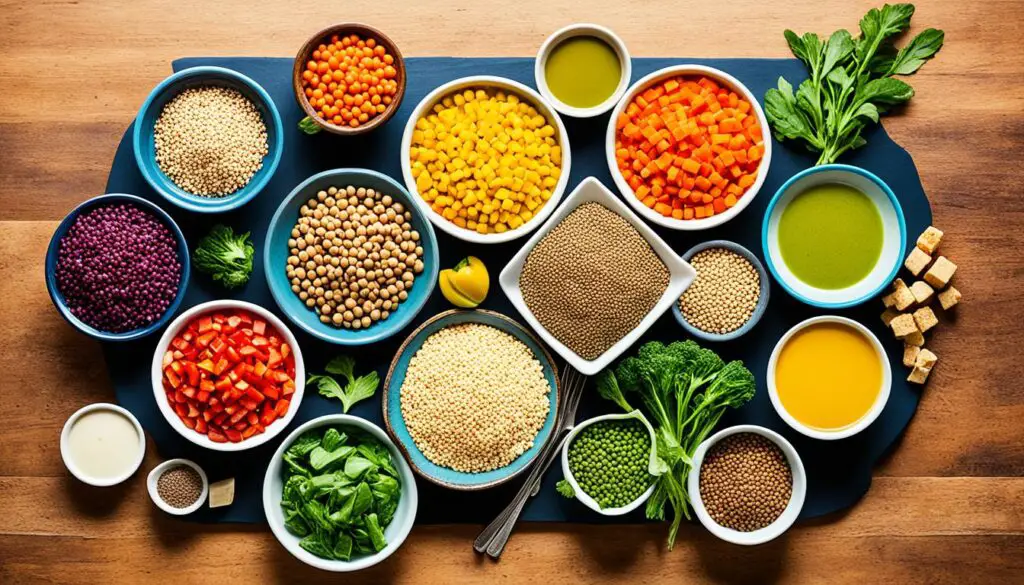
Many vegetarians have experienced remarkable success with the HCG diet by incorporating appropriate protein substitutions. By replacing meat sources with vegetarian alternatives, these individuals have achieved rapid weight loss and witnessed positive transformations in their energy levels and overall well-being.
One success story is Sarah Davis, a vegetarian who embarked on the HCG diet to shed stubborn pounds and improve her health. By incorporating plant-based protein sources into her meal plan, Sarah successfully reached her weight loss goals. She shared, “Following the HCG diet as a vegetarian was initially challenging, but once I discovered high-quality meatless proteins, I experienced incredible results. Not only did I lose weight, but I also felt more energetic and satisfied throughout the day.”
Another inspiring example is Michael Johnson, who followed a vegan diet and successfully utilized the HCG diet to achieve his weight loss goals. Michael became an advocate for plant-based protein sources during the HCG diet, stating, “Being vegan, finding suitable protein options was crucial for me. I found that incorporating tofu, tempeh, and protein-rich plant-based shakes and soups helped me maintain a high-protein diet while achieving rapid weight loss. The HCG diet truly transformed my lifestyle and overall well-being.”
Success stories like Sarah’s and Michael’s highlight the effectiveness of the HCG diet for vegetarian individuals. By embracing protein substitutes such as tofu, tempeh, and plant-based protein shakes and soups, vegetarians on the HCG diet can achieve remarkable weight loss results and experience positive changes in energy levels and overall health.
These success stories demonstrate that the HCG diet, when tailored to vegetarian preferences, can yield impressive outcomes. By incorporating protein-rich vegetarian foods into their meal plans, individuals can optimize their weight loss journey while enjoying a diet aligned with their values and dietary choices.
Check out the table below for a comprehensive list of HCG diet vegetarian protein sources:
| Vegetarian Protein Sources for the HCG Diet |
|---|
| Cottage Cheese |
| Protein Powder |
| Tofu |
| Tempeh |
| Miso Soup |
| Eggs |
These protein options provide an excellent foundation for vegetarian HCG dieters to meet their daily protein requirements and achieve their weight loss goals while adhering to their dietary preferences.
Tips for Vegetarian HCG Dieters
As a vegetarian following the HCG diet, there are a few important tips to keep in mind to ensure success and maximize your results. Incorporating these strategies into your daily routine can help you stay on track and make the most of your vegetarian protein options.
Include Probiotics: Gut health plays a crucial role in weight loss and overall well-being. Incorporating probiotics into your diet can help control gut bacteria and reduce food cravings. Add yogurt, kefir, or other fermented foods to your meals to promote a healthy gut.
Read Labels: When shopping for packaged and processed foods, it is essential to read labels carefully. Look out for hidden sugars, unhealthy fats, and unnecessary additives. Avoiding excessive sugar and fat intake can greatly contribute to achieving optimal results on the HCG diet.
Choose Clean-Label Sweeteners: When sweetening your meals or snacks, opt for clean-label sweeteners like stevia or Xylitol. These natural sweeteners provide a sweet taste without adding unnecessary calories or affecting blood sugar levels.
Enhance with Pea Protein: Pea protein is a clean and plant-based option that can be added to shakes or meals to boost your protein intake. Look for clean-label pea protein options that are free from artificial ingredients or additives. Incorporating pea protein can ensure you meet your protein requirements while following the HCG diet.
Conclusion
The HCG diet provides a viable weight loss solution for vegetarians who are looking to shed pounds and improve their overall well-being. By utilizing appropriate protein substitutions, vegetarians can successfully follow the HCG diet and achieve their weight loss goals. Incorporating vegetarian protein sources, such as cottage cheese, protein powder, tofu, tempeh, miso soup, and eggs, ensures a balanced nutritional intake while maintaining satisfactory levels of protein.
Following a vegetarian approach to the HCG diet not only promotes rapid weight loss but also boosts energy levels, making it an ideal choice for those looking to adopt a plant-based lifestyle. By embracing vegetarian protein options, individuals can experience the benefits of the HCG diet, which include appetite suppression and better food choices.
With careful meal planning and attention to nutritional balance, vegetarians can tailor the HCG diet to suit their dietary preferences and achieve successful results. The availability of high-protein vegetarian foods allows for a diverse and satisfying menu, making weight loss journey enjoyable and sustainable.
FAQ
Are there vegetarian protein sources that can be incorporated into the HCG diet?
Yes, there are several vegetarian protein sources that can be included in the HCG diet, such as cottage cheese, protein powder, tofu, tempeh, miso soup, and eggs.
How important is protein on the HCG diet?
Protein plays a crucial role in moderating hunger hormones, reducing appetite, and making better food choices. It is essential to consume enough protein on the HCG diet, whether through meat or vegetarian sources.
Which types of vegetarian diets can be compatible with the HCG diet?
The HCG diet can be compatible with all types of vegetarian diets, including vegans who avoid all animal products, lacto-vegetarians who include dairy, and lacto-ovo vegetarians who include both dairy and eggs as protein sources.
What are some protein options for vegetarian HCG dieters?
Vegetarian HCG dieters can choose from various protein-rich foods such as cottage cheese, protein powder, tofu, tempeh, miso soup, and eggs to meet their protein intake requirements.
How can vegetarian protein be incorporated into the HCG diet?
Vegetarian protein can be incorporated into the HCG diet by making substitutions for meat sources with vegetarian or vegan options. For example, replacing 30g of protein from a meat source with 30g of vegetarian or vegan protein.
How can balance and nutrition be maintained on the vegetarian HCG diet?
To maintain balance and nutrition on the vegetarian HCG diet, it is important to include a variety of high-protein vegetarian foods and ensure the calorie count and nutritional value of the foods are considered.
How can meal planning help vegetarian HCG dieters?
Meal planning can help vegetarian HCG dieters ensure they are getting adequate protein and a balanced diet by incorporating vegetarian protein sources like cottage cheese, protein powder, tofu, tempeh, miso soup, and eggs.
How can the HCG diet be adapted for vegetarians?
The HCG diet can be adapted for vegetarians by making appropriate protein substitutions and choices to meet the protein requirements while following the calorie-restricted diet.
Are there success stories of vegetarian HCG dieters?
Yes, many vegetarians have successfully used the HCG diet for weight loss and achieved rapid results by making appropriate protein substitutions. Success stories highlight the effectiveness of the diet and its positive impact on energy levels and overall well-being.
What are some tips for vegetarian HCG dieters?
Some tips for vegetarian HCG dieters include including probiotics in the diet, reading labels of packaged and processed foods to avoid excessive sugar and fat intake, and choosing clean-label pea protein options.
Can the vegetarian HCG diet provide adequate protein intake and nutritional balance?
Yes, by incorporating appropriate vegetarian protein sources, the vegetarian HCG diet can provide adequate protein intake and maintain nutritional balance.

